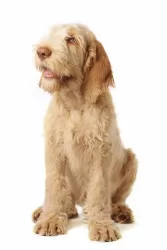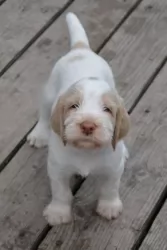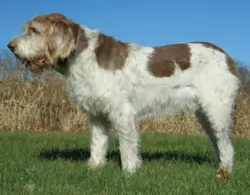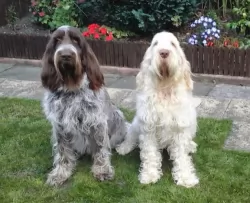 MyDogBreeds
MyDogBreedsSulimov is originated from Russia but Spinone Italiano is originated from Italy. Sulimov may grow 20 cm / 7 inches shorter than Spinone Italiano. Sulimov may weigh 24 kg / 52 pounds lesser than Spinone Italiano. Sulimov may live 5 years more than Spinone Italiano. Sulimov may have less litter size than Spinone Italiano. Both Sulimov and Spinone Italiano requires Moderate maintenance.
This Russian jackal-dog-hybrid is thought to have developed from golden jackals and Lapponian Herders. In fact the dog was developed by a certain Klim Sulimov to be a robust security- and sniffer dog at Aeroflot, a Russian airline.
Jackals were used because it is believed that they have a better sense of smell than any domesticated dog there is. The Jackal can also perceive things at a distance. Later on, other dogs were also bred into the line, making it an intelligent dog with an excellent sense of smell.
 This Italian breed has an ancient blood line tracing all the back to 500 BC. Originally bred to hunt, he is today a friendly, alert and loyal companion. He is intelligent enough to do any job you give him. The Spinone is thought to be one of the oldest gun dogs ever, but it is not entirely clear that he came from Italy. There are some who think he may have come from somewhere in these European countries – Italy, Greece, France, Celtic Ireland, Spain or Russia. However, most believe the breed came from Italy in the Piedmont area.
This Italian breed has an ancient blood line tracing all the back to 500 BC. Originally bred to hunt, he is today a friendly, alert and loyal companion. He is intelligent enough to do any job you give him. The Spinone is thought to be one of the oldest gun dogs ever, but it is not entirely clear that he came from Italy. There are some who think he may have come from somewhere in these European countries – Italy, Greece, France, Celtic Ireland, Spain or Russia. However, most believe the breed came from Italy in the Piedmont area.
The most common thinking is that he is a descendent of the Spanish Pointer and/or the Russian Setter. One other theory is that setters from Greece were brought to the Roman Empire and crossed with a variety of Italian dog to make the coarse haired Spinone we see today. Then the French put in their claim that the breed is a cross of many French pointers.
The theory that counts might just belong to the Italians who believe the ancestor to the Spinone includes the German Wirehaired Pointer, the Pudelpointer and the Wirehaired Pointer. It was not until the 19th century that the name Spinone was officially given to the breed.
Before that it might have been known as a Spinoso and named after a thorn bus in Italy called the Spino. This bush was so thick and sharp that small prey animals learned to hide under it because the predators could not get through it. The Spinone however was able to fight through the briars with its thick, coarse hair and tough skin.
The breed almost became extinct during the second world war as before and after the hunters in Italy had started to use other breeds for hunting. Breeders also began to cross the Spinone with wire hairs like German Wirehaired Pointer, the Wirehaired Pointing Griffon and the Boulet.
The most popular hunting dog in Italy today is the Bracco Italiano while the Spinone is still used for hunting.
Th Sulimov looks like, and also has characteristics of jackals and huskies. The body is large, the ears are triangular and erect, the eyes bright, alert and enquiring and the muzzle is long.
The legs of the dog are slim but strong, like the Jackal and the tail is long and bushy. The coat is fairly long, smooth and thick and can be in a range of colors such as tan, fawn, grey, white and black.
The Sulimov is a medium sized dog and stands at between 40 and 50cm in height and weighs between 12 to 15kg.
This hybrid dog is brave, confident, wily, robust, loving, affectionate and loyal. They are intelligent too and you won’t have any trouble training him.
The truth is, there isn’t much information on the personality of this breed, but they are eager to please, are full of energy and can be cheerful and feisty, even in extreme temperatures.
They’ve been bred for work and aren’t a typical family pet. Because of their wild side, they aren’t recommended for the first time dog owner or for a family pet where there are children.
If you were to keep one, it would be far better suited to life on a farm where it could have a role to play. Life in the city for this active hybrid is out of the question.
 The breed is made up of strong, solid and muscled dogs that have an almost square build. His legs are made to travel any terrain and his head is long with an occipital that is pronounced and unique to the Spinone. They are said to have “human appearing eyes”, with a docked tail in countries allowing it and webbed paws.
The breed is made up of strong, solid and muscled dogs that have an almost square build. His legs are made to travel any terrain and his head is long with an occipital that is pronounced and unique to the Spinone. They are said to have “human appearing eyes”, with a docked tail in countries allowing it and webbed paws.
Shorter hair covers their feet, head, legs, muzzle and ears. They have longer hair on their eyebrows and it is stiff, with soft hair on the muzzle and cheeks with a beard and mustache. It is a single coated dog though the coat is rough. They should have skin, lips, nose, and pads in colors that coordinate with their coats. For white dog it is a red-orange color, brown in dogs that are roan colored and dark red-orange in the orange and white colored dog.
The Sulimov makes an excellent working dog and in fact he loves to be busy. They've got an unusual feature - their tails, which are normally curled up and over the back like a husky, hang down limply when tired. Their handler know when these dogs are ready to call it a day.
They are essentially working dogs, being loyal and devoted to their handlers, but wouldn't be considered as an ideal family pet.
 3.Adaptability – Young dogs need a lot of attention but they don’t need a lot of space. The young dogs are energetic while the adult dogs are laid-back. They need exercise every day and at least a small back yard.
3.Adaptability – Young dogs need a lot of attention but they don’t need a lot of space. The young dogs are energetic while the adult dogs are laid-back. They need exercise every day and at least a small back yard.
There is ongoing debate about the health of hybrid dogs against that of purebred dogs. Hybrids inherit genetic dispositions that their parents would have, including certain heath issues.
Parasites are a huge cause of disease in dogs. Apart from ticks and fleas, internal parasites live inside the gastrointestinal tract and can be things like hookworms, tapewarms and roundwarms among others.
Parasites are usually transmitted when the dog ingests parasite eggs in contaminated water, food, feces or soil.
It’s important to get your dog treated as these parasites can cause weight loss, swollen abdomen, malnutrition, diarrhea, vomiting and anemia. Apart from this, they can affect people too. Fortunately these parasites are treatable and easy to prevent.
Other common dog ailments to look out for include bloat, obesity, cancer and hip dysplasia.
 This is an ancient breed with not a lot of documented genetic issues, but it does have one deadly condition.
This is an ancient breed with not a lot of documented genetic issues, but it does have one deadly condition.
• Cerebellar ataxia (CA) is inherited and hits the puppies. Because it is a recessive gene both the mother and father must carry it for the puppy to inherit it. This makes it less likely than it would be otherwise. Puppies with the condition do not live more than a year. Since it is a genetic problem there is now a test for it that identifies carriers at a 95% accuracy rate.
• Like many other large breed dogs, they are susceptible to hip dysplasia. This can cause arthritis and/or lameness. There are now hip replacement surgeries available for this condition.
• Bloat is again common in large dogs and you need to watch for it with the Spinone. It can be deadly if not treated immediately. Let your dog rest quietly after eating. Do not let her exercise or play energetically after eating.
This is a medium sized dog so you can buy a high quality dry kibble for him manufactured for medium sized energetic dogs.
Try and avoid the low quality dog foods which come with lots of ingredients that are plain ordinary bad for your dog, and can jeopardize his health.
Try and feed him some home-made food too – boiled chicken, brown rice or pasta and some nutritious vegetables such as spinach,sweet potatoes and carrots. Chop it all up and add some of it to the dry kibble twice a week.
You can also provide him with some raw fish and raw red meat occasionally as this keeps the skin and coat healthy. Make sure he always has fresh, cool water available.
Have him trained and socialized. As it is, for the job he does as a security dog, he is trained and socialized.
Provide him with lots of exercise – walks, ball games, exercises that stimulate mind and body.
 1Feeding the puppy – feed a high quality dog food for puppies of large breeds. Feed 3-4x day but don’t overfeed or let him exercise after eating even as a puppy.
1Feeding the puppy – feed a high quality dog food for puppies of large breeds. Feed 3-4x day but don’t overfeed or let him exercise after eating even as a puppy.
2.Feeding the adult - feed a high quality dog food for large breeds. Feed 1-2X day but don’t overfeed or let him exercise after eating.
4. Games and Exercises – The Spinone is an active breed, but not a fast dog. In fact, they like to travel at a trot so it becomes a great dog for jogging or running with. They love to jump, track, hunt, hike. They do well with agility, retrieving, flyball, carting, being a therapy dog, a rescue dog and a watchdog.